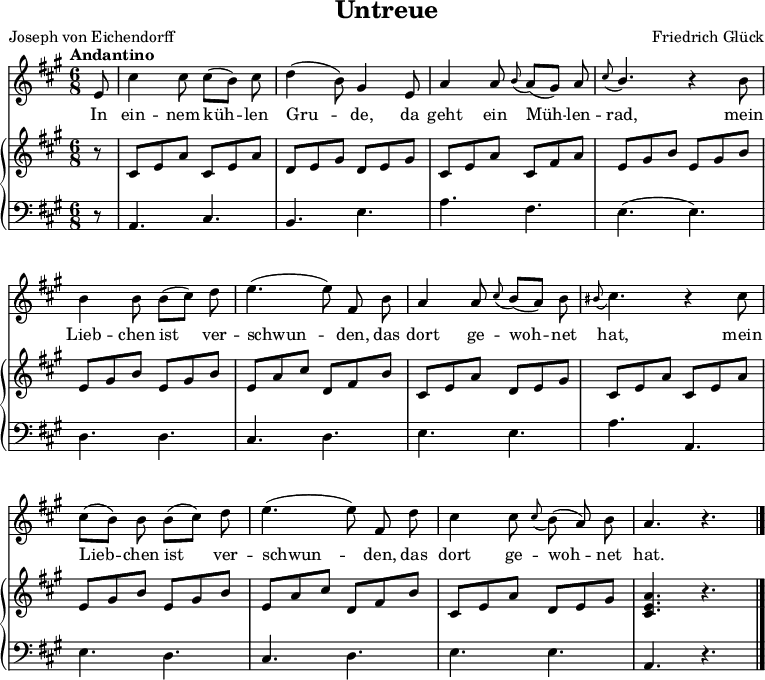| Das zerbrochene Ringlein | |
|---|---|
| by Joseph von Eichendorff | |
 | |
| First published in | 1813 (1813) |
| Language | German |
| Subject(s) | unhappy love |
| Rhyme scheme | a–b–a–b |
| Publisher | Justinus Kerner |
| Lines | 20 |
"Das zerbrochene Ringlein" (The broken little ring) is a poem by Joseph von Eichendorff, published under the title "Lied" (lay, or song) in 1813 by Justinus Kerner et al. in the almanac Deutscher Dichterwald (German Poets' Forest) under the pseudonym "Florens". The poem appears under Eichendorff's name in his first novel Ahnung und Gegenwart [de], written in 1812 and published in 1815. It is also known by its first line, "In einem kühlen Grunde" (In a cool valley).

Friedrich Glück [de] set Eichendorff's poem to music under the title "Untreue" (Infidelity). Friedrich Silcher wrote a 4-part arrangement for male choir which became popular through its publication in Volksliederbuch für Männerchor [de] (1906).
The song has been recorded by many artists.
Text

|
"Das zerbrochene Ringlein" |
"The Broken Ring" |
Melody

The song as published by Friedrich Glück.

References
- Joseph von Eichendorff: "Lied", Deutscher Dichterwald, J. F. Heerbrandt'sche Buchhandlung, Tübingen 1813 (in German), p. 227.
- Joseph von Eichendorff: Ahnung und Gegenwart. Schrag, Nürnberg 1815, pp. 356–357 – via Deutsches Textarchiv [de]
- ^ Friedrich Glück (c. 1828). Lieder für eine Singstimme mit Begleitung des Pianoforte (in German). Munich: Makarius Falter [de]. p. 10 – via Munich Digitization Center.
- "Untreue" (Glück), from Volkslieder gesammelt und für vier Männerstimmen gesetzt: Scores at the International Music Score Library Project
- "491. Untreue". Volksliederbuch für Männerchor (in German). Vol. 2. 1906. p. 448 – via Internet Archive.
- Covers of "In einem kühlen Grunde", cover.info
- Robert Marcellus Browning, ed. (1984). "The Broken Ring". German Poetry from 1750 to 1900. The German Library, vol. 39. Translated by Geoffrey Herbert Chase. New York: Continuum. pp. 146–147. ISBN 9780826402820.
External links
 Media related to In einem kühlen Grunde at Wikimedia Commons
Media related to In einem kühlen Grunde at Wikimedia Commons German Wikisource has original text related to this article: "Lied" (Eichendorff)
German Wikisource has original text related to this article: "Lied" (Eichendorff)